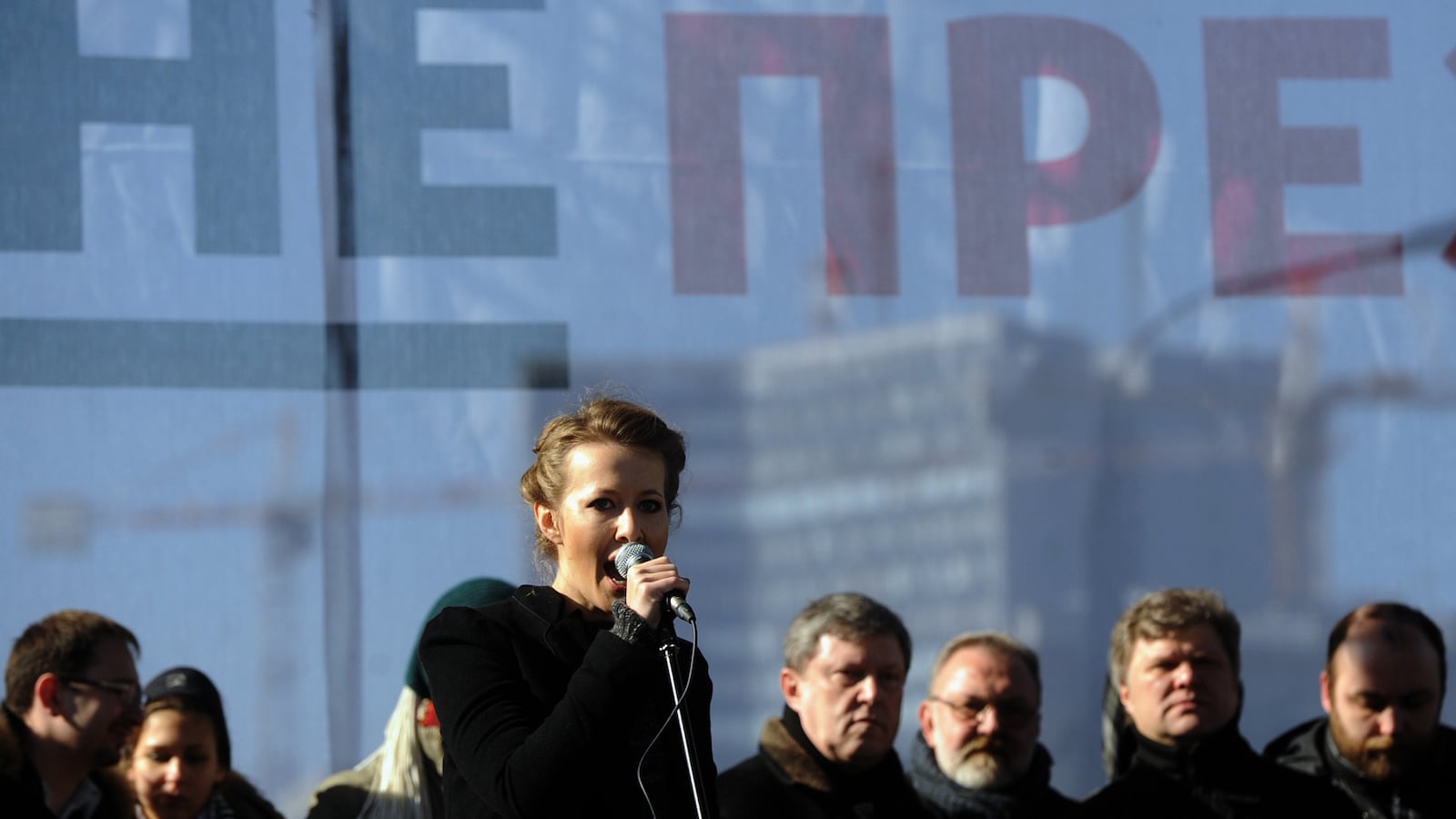Ksenia Sobchak perches on an office chair, barefoot and cross-legged, as makeup artists and stylists fuss around her hair and face. She’s shooting a pilot for a TV drama in which, according to a producer, she “plays herself”—a beautiful, wealthy businesswoman who lives in a glamorous Moscow penthouse with the world at her feet. Except the show is already out of date. Wealthy Sobchak may be, and beautiful—but as of last week, when masked police piled into her Moscow apartment and arrested her and her boyfriend, opposition leader Ilya Yashin, Sobchak is also the latest victim of Vladimir Putin’s harsh crackdown on dissent.
What makes Sobchak’s fall from grace remarkable is that she is a hereditary member of the Putin’s very small inner circle of “nashy,” or “our people.” Her father, former St. Petersburg Mayor Anatoly Sobchak, was Putin’s professor on the law faculty of St. Petersburg University, and later became Putin’s boss in the mayor’s office. Putin is not, as is often reported, Sobchak’s godfather (she was christened in 1983 and the priest at the Cathedral of Alexander Nevsky in St. Petersburg is her actual godfather). But Putin is a close family friend and, until a few months ago when Sobchak began supporting the opposition movement, was her ticket to social and showbiz success and the best “krysha”—Russian slang for official protection—that a girl could have.
Putin “is someone who divides people into ‘with us’ and ‘against us,’” Sobchak told The Daily Beast. “I still respect him as a person, he has done a lot for Russia.... But he probably believes that I am no longer ‘with him,’ and I am feeling the consequences of that now.”
Sobchak’s fall came with shocking speed. Just six months ago, she was Russia’s biggest TV celebrity, fronting the Russian equivalent of Big Brother and the reality-TV show “Chocolate-Covered Blonde”—a play on a Russian phrase meaning someone who has everything. But then she began frequenting the anti-Putin demonstrations that brought 100,000 people onto the streets of Moscow to protest what appeared to be rigged elections in November. Sobchak was booed as she first took to the stage at the biggest rally on Moscow’s Sakharov Prospekt by protesters who resented her rich-girl image and trashy TV persona.

“For a decade, Sobchak was a symbol of everything people hated” about the glam Moscow elite, says satirist Viktor Shenderovich. “She never had any real talents, but had a ticket to success because of her association with Putin’s boring nomenclature elite.” Sobchak was once known for her floor-length mink coats, gold boots, and for accepting diamond jewelry from the Chechen autocrat Ramzan Kadyrov. But at the rally, Sobchak pressed on over the catcalls and her message was intelligent, and stirring. “I’m Ksenia Sobchak, and I’ve got something to lose. But I’m here,” she told the crowd. “We must try to influence the government, not fight to take power.” Many were impressed. “If 100 people like her would dare to risk losing everything—their money, prestige, and jobs—in the same way that Sobchak did, then the country would have a real chance to change for the better,” says gallery owner and sometime Kremlin political strategist Marat Gelman.
To Putin, Sobchak’s were fighting words. In subsequent weeks many family friends and go-betweens came to warn Sobchak to cool it on her support for the opposition. She didn’t—and soon the TV channels with whom Sobchak worked, including TNT and MuzTV, an MTV lookalike, didn’t renew her contracts. Then, in March, investigators tried unsuccessfully to bring criminal charges against her after a scuffle broke out between Sobchak’s dinner companions and a pair of female undercover reporters from the Russian tabloid Life News in a fashionable restaurant she promotes. In May, Sobchak found herself behind bars for the first time, briefly arrested along with hundreds of others during a protest rally on the eve of Putin’s inauguration on May 6th. But it was last week’s raids on a slew of opposition leaders’ apartments— including Sobchak’s—on the eve of another massive protest that sent the clearest message that she was now firmly no longer under the Kremlin’s protection.
“Putin finally decided to punish her because, to him, she is worse other critics—she is not just an enemy but a traitor,” says Shenderovich. “And he destroys those who betray him.”
Masked paramilitary police showed up at dawn at Sobchak’s apartment on June 11th with a search warrant and spent hours going through her effects, reading out personal emails from her laptop and sarcastically asking her why she didn’t “marry a good FSB officer.” Photos and juicy details of the raid—including what kind of underwear Sobchak wears—were quickly leaked to the police’s favored tabloids like Life News, along with the sensational news that opposition leader Ilya Yashin had spent the night in her apartment. Most damming of all, though, were nearly 100 envelopes containing a total of $1.7 million in cash that police found in Sobchak’s safe and confiscated, along with her passport.
Sobchak says that she declares an income of between $1 million and $2 million a year, and that the cash was her legitimate show-business earnings. Investigators told the Russian daily Izvestia that Sobchak’s declared 2011 income was just $210,000, laying her open to possible charges of tax evasion, which carries a penalty of up to three years in jail. “This is a provocation,” Sobchak told The Daily Beast. “I don’t have to justify myself. I work a lot and I earn a lot. They of course can make up whatever they want, but in reality my business affairs are completely transparent.”
All the same, several fellow opposition activists have tried to distance themselves from Sobchak, while the pro-Kremlin media have suggested that the money is part of a foreign plot to fund the opposition. Ilya Ponomarev, one of just two remaining anti-Putin members of the Duma, Russia’s parliament, wrote that Sobchak “should not be associated with the leadership of any future rallies” until she had cleared her name. “All of the opposition’s leaders must be above suspicion.”
Others worry that Sobchak discredits the movement because her presence associates protests with a fashionable Moscow elite. “Sobchak is a fake. She does not pronounce any radical statements —all she does... she hangs out with opposition as a part of new fashion,” says radical nationalist Alexander Belov. “Before it was glamorous to be a member of the golden youth, now it’s fashionable to be anti-Putin. She is just a mercantile girl looking for a new commercial angle.” Even after Sobchak’s fall, former Bolshoi Ballet dancer and fellow It-girl Anastasia Volochkova isn’t prepared to cut her any slack: “Ksenia is the most aggressive and poisonous of all celebrities. If she represents opposition, I am ashamed of my country. Even Putin has finally gotten sick of her dirty tricks.”
Sobchak says she is resigned to the fact that she’s burned her bridges with the regime. “There has been no negotiation, no bargaining. Nothing I can do now will stop the process. The machine of repression can only be started, it can’t be stopped—even by Putin,” she says. “If I went out on Red Square and announced that I was joining [Putin’s party] United Russia, everyone would think I was just mocking them.”
From the Kremlin’s point of view, though, the message has been sent loud and clear. Putin does not intend to give any ground to the opposition that has flared so dramatically since his decision to return to office for a third term. Dissent carries a heavy price—especially for those who betray the key Putin family value of loyalty.







